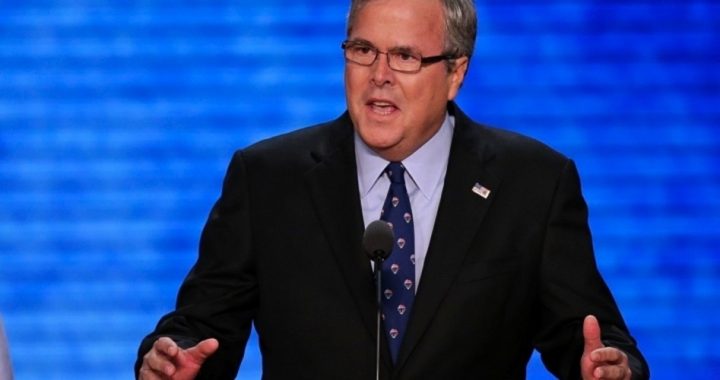
During an interview on MSNBC’s Morning Joe program on Tuesday, former Florida Governor Jeb Bush (pictured) revealed that he would now support legislation that provided a “path for citizenship” for illegal immigrants.
During the interview, which coincided with the release of Immigration Wars, the book Bush coauthored with Clint Bolick, Bush said he favors a “path to legalization.”
Morning Joe’s co-host Mika Brzezinski asked Bush about a statement e-mailed by an unnamed Romney advisor to the Miami Herald: “Where the hell was Jeb Bush during the [Romney] campaign? … He spent all this time criticizing Romney and it turns out he has basically the same position. So he wants people to go back to their country and apply for citizenship? Well that’s self deportation. We got creamed for talking about that. And now Jeb is saying the same thing.”
Bush bristled and claimed that the book proposed six points of immigration reform that are different from what was advocated by either candidate in last year’s presidential election. Bush said that in the book, he and Bolick proposed “a path to legalization.”
“What’s the difference between a path to legalization and a path to citizenship?” asked Scarborough.
Bush replied: “The principal difference … the principle underlying what we’ve proposed is that if you don’t have a difference between a path to citizenship or a path to legalization, you’re going to create a magnet going forward for more illegal…”
Scarborough interjected: “You’re going to repeat what happened in today’s … Reagan amnesty.”
Bush continued: So going forward — we wrote this last year — going forward if there is a difference, if you can craft that in law where you can have a path to citizenship where there isn’t an incentive for people to come illegally I’m for it. I don’t have a problem with that.”
Near the conclusion of the interview, Bush replied to a question from political analyst Mark Halperin, who asked: “Governor, just to clarify an important point of a path to citizenship, if there was a piece of legislation that had a pathway to citizenship … people who came here illegally eligible to become citizens without touching back in their home countries, would you support that?”
Bush replied: “I would support it if it didn’t create an incentive for people to come illegally at the expense of coming legally.… There is no path to citizenship for a majority of people trying to come to the country. If you say ‘get in line,’ there is no line or the line is so large that it’s a mythical line … 160 years for lines in Philippines.”
“If you change the system so that there is a legal path and you have a different term for people that are here already illegally so that the incentive isn’t to continue to have that process, then I would support that for sure,” Bush continued. “The book doesn’t propose that because this is a clearer way to create that delineation.”
Bush seems to be trying to take a political stance that he can void through verbal shenanigans reminiscent of Bill Clinton’s infamous reply about whether he had sex with Monica Lewinsky: “It depends what the meaning of the word ‘is’ is.” Using “different terms” for people who are here illegally has long been a point of contention between those who advocate strict enforcement of our immigration laws — who prefer the term “illegal” — and those who would legalize the status of such persons and prefer the term “undocumented.” The distinction in terminology also extends to those who insist that a “pathway to citizenship” for those who have entered our country illegally differs from amnesty.
Both MSNBC and another report from ABC News noted that the position taken by Bush on this morning’s program differs from what he and Bolick proposed in Immigration Wars. ABC reporter Jordan Fabian noted:
Bush’s comments stirred the pot not only because he had previously said he could back a path to citizenship, but also because of their precarious timing. The Senate is now considering a bipartisan immigration reform bill that would allow many of the nation’s 11 million undocumented immigrants to seek citizenship, which is backed by Bush’s former protégé Sen. Marco Rubio (R-Fla.)
Rubio, who was elected with strong Tea Party support and is popular among conservatives, is among a group of eight senators who drafted a “bipartisan” immigration plan released to the public on January 28. The day before the release of a synopsis of the plan, the Las Vegas Review-Journal published an article by Rubio in which he outlined his vision for immigration reform. Rubio noted in that article:
We can’t round up millions of people and deport them. But we also can’t fix our broken immigration system if we provide incentives for people to come here illegally — precisely the signal a blanket amnesty would send.
Instead, the first step should be to require those who have not committed any felonies and are assimilated into America, to have the opportunity to apply for temporary non-immigrant status. [Emphasis added.]
Rubio’s distinction between “blanket amnesty” and “apply[ing] for temporary non-immigrant status” may be as difficult to distinguish as Jeb Bush’s distinction between “a path to legalization” and “a path to citizenship.” And while Bush claimed that his latest comments provide “a clearer way to create that delineation,” Americans opposed to amnesty may not see that delineation as clearly as Bush.
In a review of Immigration Wars, Byron York, chief political correspondent for the Washington Examiner, observed:
In the book, Bush argues that he opposes a path to citizenship because lawbreaking should not be rewarded with citizenship. Now, he says he might support a path to citizenship if it did not create an incentive for more illegal immigration. One argument is based on principle; the other on pragmatism.
York ended with the rhetorical question: “What does Jeb Bush actually believe should be done about the nation’s immigration problem?”
We expect we shall be hearing more about Jeb Bush’s beliefs on immigration, as the leading contenders for the 2016 Republican presidential nomination jockey for media exposure and position. As for the chances of the dominant GOP position being substantially different from the position embraced by most Democrats, Bush provided us with a clue in today’s interview: “Thankfully now there is a consensus brewing among Democrats and Republicans that there needs to be a consensus.”
Photo of former Florida Governor Jeb Bush: AP Images



